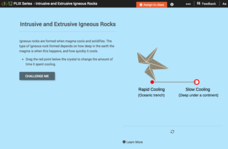Curated OER
What is Soil?
Students examine soil. In this earth science lesson, students define and describe weathering and erosion as it relates to soil. Students compare and contrast potting soil with forest soil and complete a science observation worksheet.
Curated OER
pH and Red Cabbage Juice
Learners review properties of materials and define what pH tells them about matter. For this pH levels lesson, students determine whether materials are acids or bases using indicator substances.
Curated OER
Atmospheric Processes - Conduction
Students explain the process of conduction using a molecular explanation, and explain how different materials conduct at different rates.
Curated OER
Cloud and Weather Patterns
Fourth graders examine how weather patterns generally move from west to east across the United States, and how clouds are formed and are related to the water cycle. They view and discuss a PowerPoint presentation of the types of clouds,...
Curated OER
Reasons for the Seasons
This worksheet requires the pupils to follow a teacher activity, so more-than-the-usual preparation for a practical is needed. Looking at a globe as it rotates and receives "sunlight" from a flashlight, pupils are able to observe the...
Alabama Learning Exchange
Good Litter, Bad Litter
Which ones can be thrown on the ground? Discover the difference between natural litter and unhealthy trash, helping scholars by using several examples. Use the information here to give them a basic background, but also encourage prior...
Curated OER
It's Raining, It's Pouring: The Water Cycle
Middle schoolers investigate the relationship of the steps in the water cycle, and create a simulation of the water cycle in a jar.
Curated OER
It's a Gas! Or is it?
Examine the effects of temperature and pressure on solubility and the states of matter of ocean water. Learners make inferences about the unique chemistry of ocean water at different depths. They engage in an activity related to...
Curated OER
May the Force be with You -- All about Force and Gravity
Here is a fabulous set of teacher's notes that will make your next hands-on gravity and force lab fun and interesting. These notes provide you with three activities that allow children to make and test hypothesis regarding force,...
Curated OER
Air Pressure
Learners participate in a series of demonstrations about Bernoulli's principle. They explain how air pressure varies with air speed. They write a detailed lab report about the activity. This is a great way to explore this concept.
Curated OER
Natural Disaster
Describe how plate tectonics account for various land formations. Learners discuss different marine sanctuaries and create a poster about tectonic activity in these areas. They share their posters with the class.
Curated OER
Understanding Climate Change
The young scientists in your class will appreciate a resource about different elements of climate change. The packet includes factual materials, informational text, and clear visuals, perfect for sharing with your environmental science...
CK-12 Foundation
Intrusive and Extrusive Igneous Rocks
Check out a resource that's erupting with engaging material! Earth science scholars discover how igneous rocks form in a well-rounded interactive. They manipulate the cooling time of lava to watch crystals form, learn visual...
NOAA
Ocean Currents
Go with the flow! The eighth installment in a 13-part series has earth science students dive in to the world's system of ocean currents. The interactive illustrates the different types and depths of currents, how wind and gravity...
NASA
Development of a Model: Analyzing Elemental Abundance
How do scientists identify which elements originate from meteorites? Scholars learn about a sample of material found in a remote location, analyzing the sample to determine if it might be from Earth or not. They study elements, isotopes,...
Curated OER
The Coriolis Effect
Students will determine the direction of Earth's rotation as viewed from the north and south if they were suspended out in space. They will model how the rotation of the Earth causes currents to be deflected in different directions for...
Other popular searches
- Describe Earth Materials
- Earth Materials Uses
- Classifying Earth Materials
- Compare Earth Materials
- Identifying Earth Materials
- Earth Materials Word Find
- Earth Materials and Process
- Earth Materials Building
- Earth Materials Fuels
- Earth Materials + Uses
- Earth Materials +Fuels
- Earth Materials + Building

















